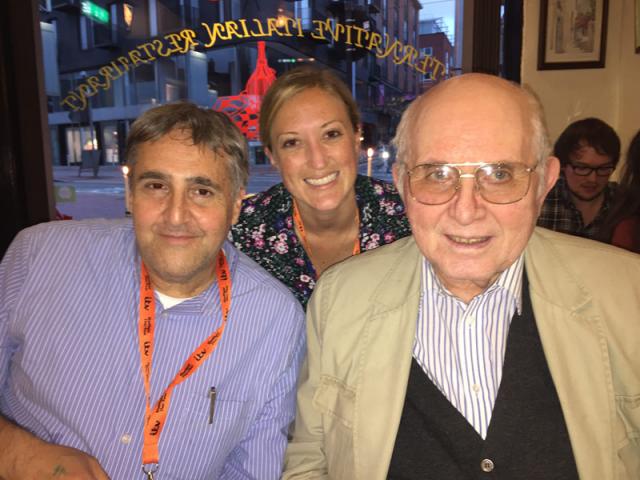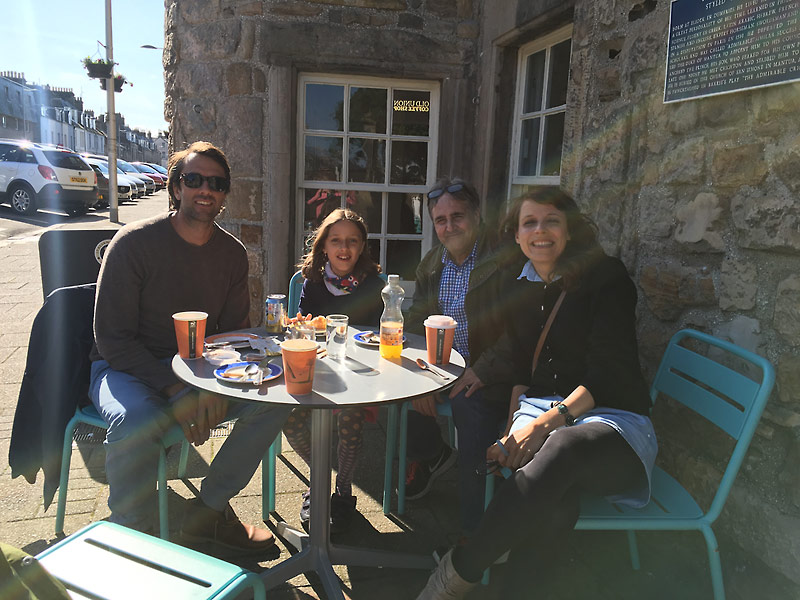A childhood lost, a childhood found
At its physical core, USC Shoah Foundation is an impressive bank of computers and programs that bring the testimony of genocide survivors to people around the world.
It’s a complicated and mysterious process for those who don’t have advanced degrees. But beyond the connections of wires and microchips, there is something far more mysterious and complicated going on: the human connection that takes place between people from different times, different places and different backgrounds when they engage with testimony.
 I’ve experienced both kinds of connections since I’ve worked at the Institute, but I had the chance to see its impact on the general public when I traveled with some of my co-workers to the Sheffield Doc/Fest in England early in June. We were there to introduce the Institute’s New Dimensions in Testimony project, an innovative marriage of technologies and testimony that allows people to interact with Holocaust survivors about their life experiences.
I’ve experienced both kinds of connections since I’ve worked at the Institute, but I had the chance to see its impact on the general public when I traveled with some of my co-workers to the Sheffield Doc/Fest in England early in June. We were there to introduce the Institute’s New Dimensions in Testimony project, an innovative marriage of technologies and testimony that allows people to interact with Holocaust survivors about their life experiences.
Hundreds of people entered the NDT exhibit over the six days of the festival, which is one of the largest documentary festivals in the world. What I saw reminded me exactly how powerful and transformative our work can be.
People were often unsure when the first walked into our exhibit space. They didn’t know what to expect and perhaps thought we were offering some kind of gimmick. But after a few minutes of having a ‘virtual conversation’ with Holocaust survivor Pinchas Gutter, their trepidations vanished and they became lost in the moment. The image on the screen became real as they delved deeper into conversations. Some people stayed for hours. Many cried. Others thanked him before they left, as if they were conversing with the real Pinchas. In other words, the connections were real and meaningful. The encounter shook them. You could see it in their eyes as they stared nearly unblinking at the television screen in front of them.
I made my own new connections during the trip as well. Even though I spent hours with the exhibit, Pinchas’ testimony continued to surprise me with answers to questions I had never heard before. One in particular hit me hard. The story itself wasn’t nearly as dramatic as many of the others that detail how he survived in five concentration camps after his family was murdered.
No, this exchange involved a happier time before the war when Pinchas was a little boy. The story he told was about how he begged his mother for a hat he saw in a toy store. She refused, but after weeks of begging, she relented and finally bought it for him. He had a few glorious day of playing with it.
Why did that story get to me more than others? Maybe it was because it showed what life Pinchas and millions of other should have had, but were denied. It was a mundane story, but his life should have been filled with mundane stories, instead of the horrors he endured. He had a right to be part of a normal, flawed family, but it was ripped away from him.
 Josh Grossberg (third from left) with Olga and her husband and daughter
Josh Grossberg (third from left) with Olga and her husband and daughterPinchas lost his childhood and had his innocence robbed from him. But as I watched the little girl play, I realized that every generation gets a new opportunity to make things right – we have the chance and an obligation to raise happy children in an imperfect world.
She and Pinchas don’t know each other, but I felt a string connecting both of them through me. And I felt the weight of responsibility push down on my shoulders that it is up to me and every one of us to ensure that this one little girl – and all the children in the world too young to know evil exists – have the childhood that Pinchas and millions of others deserved.
Like this article? Get our e-newsletter.
Be the first to learn about new articles and personal stories like the one you've just read.